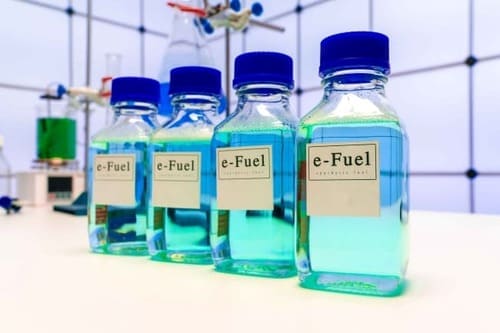
Synthetic fuel: what it is, when it will be available, and how it differs from conventional fuel
As the global community seeks to address the urgent need to reduce carbon emissions, synthetic fuel is emerging as a promising alternative to conventional fossil fuels. Here we will give you an overview of synthetic fuel, including its potential availability, and how it differs from traditional energy sources.
What is synthetic fuel?
The lab-produced liquid possesses similar properties to gasoline, diesel, and jet fuel. Notably, synthetic products address the environmental concerns associated with fossil fuels by being derived from renewable resources such as wind, solar, or biomass. This production process copies natural fossil petrol/diesel formation but in a significantly shorter timeframe.
Furthermore, synthetic fuel offers benefits beyond emissions reduction. Unlike traditional gasoline, synthetic fuel burns cleaner, which can lead to less carbon buildup in engines and exhaust systems. This means that vehicles running on it may need less maintenance, including fewer replacements of components like a new car fuel filter.
How is synthetic fuel made?

The first step in making it is to capture carbon dioxide from either the air or industrial emissions. The CO2 is then mixed with hydrogen, which is made through a process called water electrolysis. Using renewable energy sources, such as solar or wind power, to power the electrolysis process ensures eco-friendly hydrogen production.
The mixture of CO2 and hydrogen undergoes a series of chemical reactions to produce synthetic hydrocarbons. These hydrocarbons can be refined into various types of energy sources such as petrol, diesel, or jet fuel. This synthetic fuel can then be used in conventional engines, including those with a diesel or petrol fuel pump, ensuring compatibility with existing vehicles.
When will synthetic fuel be available?
There's a lot of interest in the possibility of producing synthetic fuel on a commercial scale. Porsche is one of the companies leading the way, investing a lot in research and production facilities. Porsche's environmental projects, like the Haru Oni pilot plant in Chile, are aiming to produce large quantities of it in the next few years. It's worth mentioning once more that the fuel can work with any vehicle system, including those with Porsche fuel pumps for diesel and petrol.
Experts predict that it could become commercially available by the mid-2020s, with wider adoption expected in 2030. However, the move to synthetic fuel depends on several factors, including advancements in production technology, reductions in manufacturing costs, and supportive regulatory frameworks. By surmounting these obstacles, synthetic fuel holds the potential to revolutionise the energy landscape and pave the way towards a more sustainable future.
Is synthetic fuel the future?
Synthetic fuel has the potential to reduce carbon emissions significantly, which makes it an attractive option for the future of transportation. As the automotive industry moves towards more sustainable practices, it is a great way to reduce the environmental impact of internal combustion engines. What's more, it can be used in conjunction with electric vehicles, which is a positive step toward achieving carbon neutrality.
However, for the fuel to become widely adopted, there are a few challenges that need to be overcome. These include making it easier to produce, making it cheaper to make, and the development of supportive policies and infrastructure. If these hurdles can be overcome, it could be a real game-changer in transitioning to a sustainable energy future.
In conclusion, synthetic fuel offers a promising alternative to conventional petrol and diesel. It has the potential to significantly reduce carbon emissions and contribute to a cleaner environment. With companies like Porsche leading the charge and advancements in production technology, it could become widely available within the next decade. As we continue to explore sustainable energy solutions, these synthetic products stand out as key players in the future of transportation.
Top products related to this topic:


































